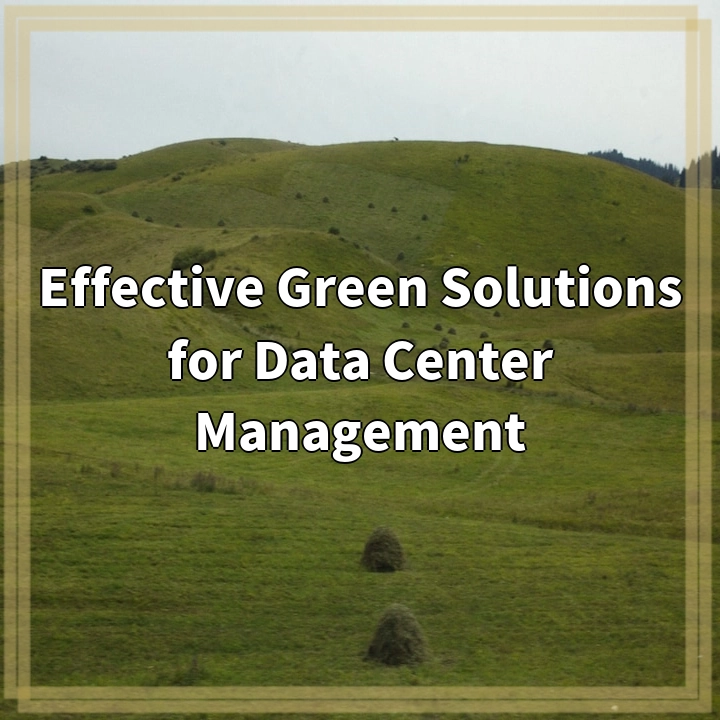
What is Data Center Management?
Data center management refers to the process of overseeing and controlling the operations of a data center, which is a facility that houses computer systems and associated components, such as servers, storage, network devices, and telecommunications equipment. It involves ensuring the availability, reliability, and security of the data center infrastructure and the systems it supports.
Real-World Problems in Data Center Management
Data center management faces several challenges in today’s digital landscape. These problems can hinder efficient operations and have negative environmental impacts. Some of the key challenges include:
1. Energy Consumption:
Data centers consume significant amounts of energy to power and cool the equipment. This high energy demand contributes to carbon emissions and can have a substantial environmental impact.
2. Heat Dissipation:
The servers and equipment in data centers generate immense heat, requiring efficient cooling systems to prevent overheating. Inadequate cooling infrastructure can result in equipment failure, reduced lifespan, and increased energy consumption.
3. Waste Generation:
Data center operations can generate a substantial amount of electronic waste through the regular replacement of outdated equipment and components. Improper disposal or recycling of this waste can lead to environmental pollution.
4. Water Usage:
Some data centers rely on water for cooling purposes, which can place a strain on local water resources. Moreover, the discharge of warm water back into the environment can negatively impact aquatic ecosystems.
5. Scalability and Flexibility:
Data centers need to adapt and scale their operations to accommodate increasing volumes of data and advancements in technology. This requires careful planning and investment in flexible infrastructure to avoid inefficiencies and waste.
6. Data Security:
Data centers store and process vast amounts of sensitive information. Ensuring robust security measures to protect against breaches, cyber-attacks, and unauthorized access is critical but can be a significant challenge.
Addressing these real-world problems is vital for effective data center management. Implementing green solutions can help mitigate the environmental impact, reduce operating costs, and improve the overall efficiency and sustainability of data center operations.

Solutions for Green Data Center Management
Green solutions can help address the real-world problems associated with data center management. By adopting these solutions, companies can reduce their environmental footprint and improve the overall efficiency of their data centers. Key solutions include:
1. Energy Efficiency:
Implementing energy-efficient practices and technologies can significantly reduce a data center’s energy consumption. This includes using server virtualization and consolidation, optimizing cooling systems, and utilizing energy-efficient hardware and equipment.
2. Renewable Energy:
Integrating renewable energy sources, such as solar or wind power, into data center operations can reduce reliance on fossil fuels and decrease carbon emissions. Data centers can purchase renewable energy credits or install on-site renewable energy generation systems.
3. Cooling Optimization:
Efficient cooling strategies, such as hot aisle/cold aisle containment, liquid cooling, and variable speed fans, can minimize energy waste and improve cooling efficiency. Implementing precision cooling systems and intelligent temperature monitoring can also contribute to better heat management.
4. E-Waste Recycling:
Data centers should prioritize responsible e-waste management by partnering with certified recycling facilities and ensuring proper disposal of old or obsolete equipment. Implementing asset management programs can also help extend the lifespan of equipment.
5. Water Conservation:
Data centers can implement water recycling systems, use water-efficient cooling methods, and explore alternative cooling technologies that minimize water usage. Adopting cooling techniques such as air-side economizers and water-side economizers can also reduce water requirements.
6. Scalable Infrastructure:
Data centers should plan for scalability and flexibility by investing in modular and flexible infrastructure designs. By right-sizing their equipment and adopting cloud computing or colocation services, data centers can achieve higher resource utilization and reduce energy waste.
7. Enhanced Data Security:
Ensuring robust data security measures, such as multi-factor authentication, encryption, and regular security audits, helps protect valuable data from breaches. Implementing energy-efficient security solutions can also reduce the environmental impact of security systems.
By embracing these green solutions, data center managers can create more sustainable and environmentally friendly operations, while also potentially reducing costs and improving overall performance.















